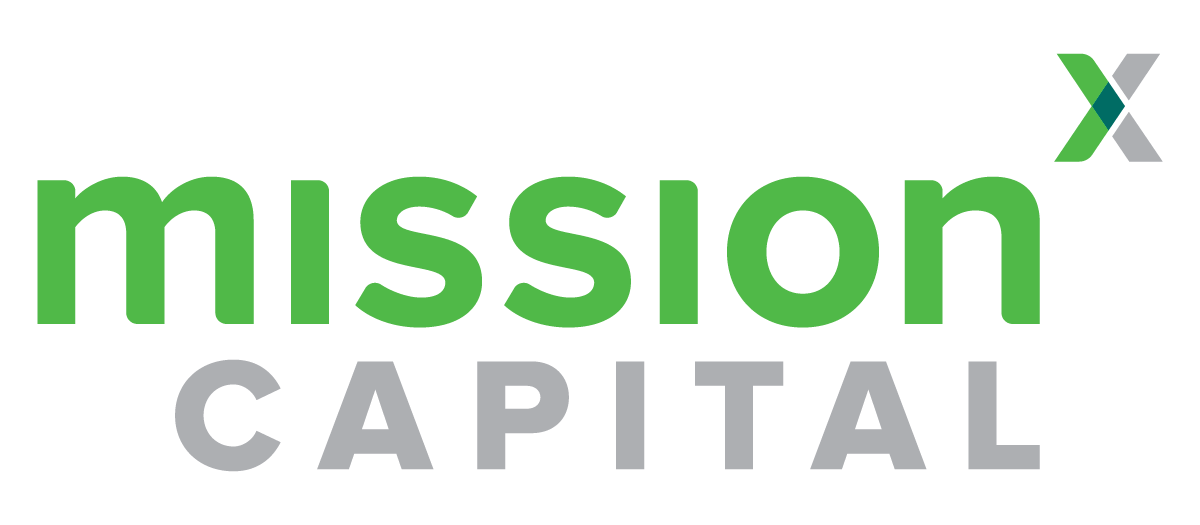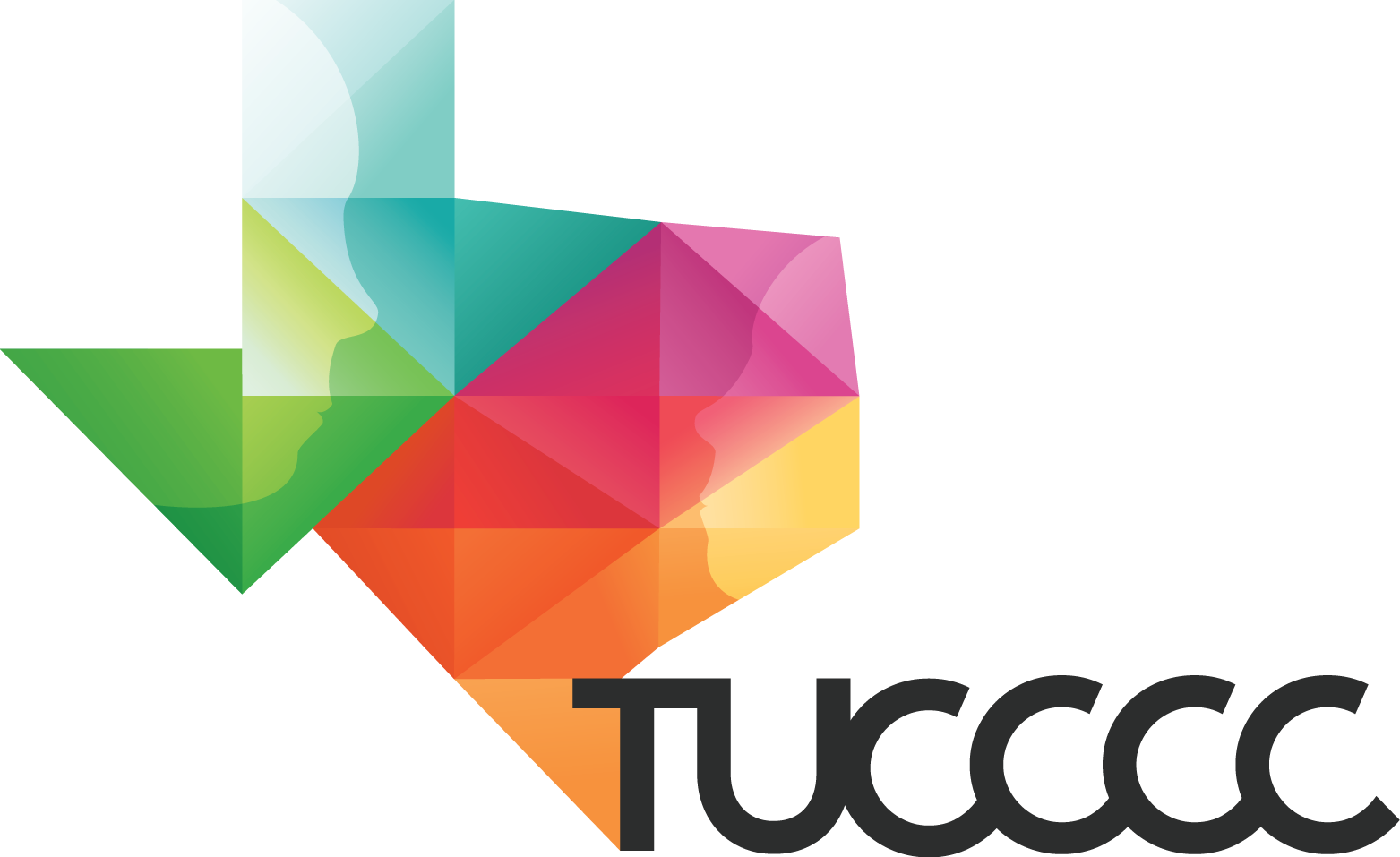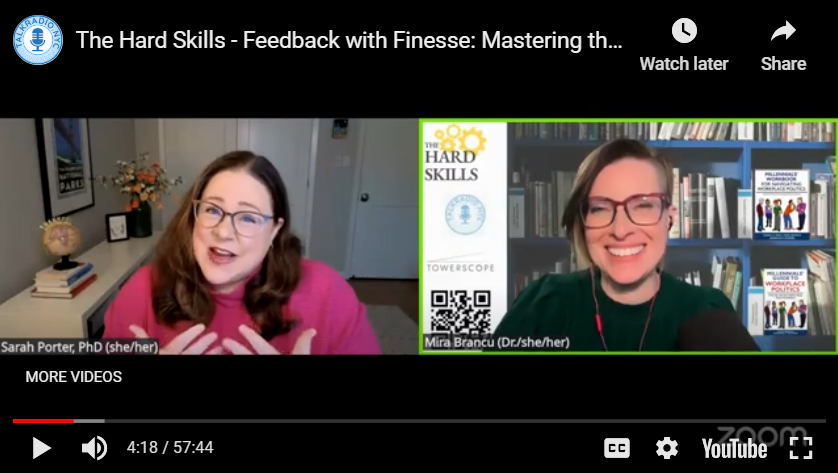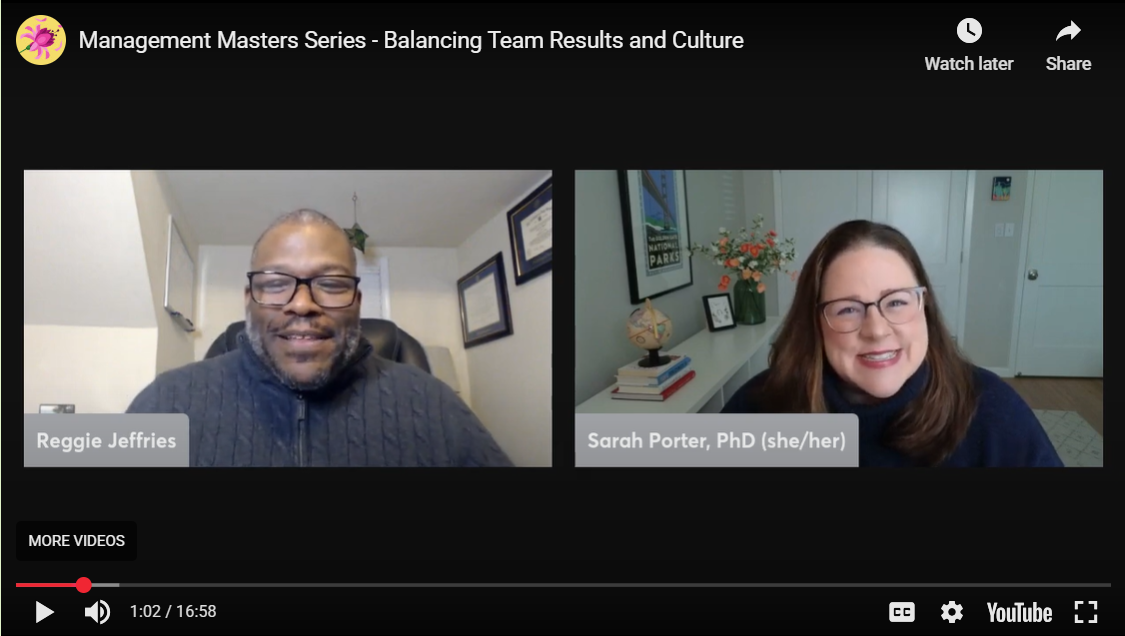Speaking | Training
With over 900 workshops, courses, and keynotes under my belt, I know how to connect with any crowd — from five people in a virtual strategy session to 5,000 in a packed auditorium.
I am committed to delivering experiences that spark ideas, inspire action, and leave a lasting impact.
Keynote & Workshop Topics
-
Many of us have a love-hate relationship with performance discussions. As the feedback giver, you want to strike a balance between recognizing strengths and addressing weaknesses, yet you sometimes struggle to get it right. As the recipient, you crave insights that will drive your development, but you don’t always walk away feeling fully seen or clear on your next steps.
In this one-hour keynote or two-hour interactive session, you will learn proven strategies to transform your approach to feedback. Master how to communicate praise and constructive criticism so that they land well. Discover techniques for responding that enhance your understanding and accelerate your career momentum. Leave better equipped to navigate these tricky conversations, ultimately elevating your performance and that of your team.
Participants will learn how to: (a) identify the individual and organizational benefits of high-quality feedback; (b) articulate four core culture pillars that create an environment where leaders and contributors alike can give and receive meaningful input; (c) utilize an evidence-based approach to successfully deliver positive and negative performance feedback; and (d) respond to feedback in a way that is both empowering and career-enhancing.
-
If persistent pain is holding you back, know that hope is on the horizon. In this 2 ½-hour skills-based workshop developed by Stanford University experts, you will discover practical, neuroscience-backed strategies to reduce chronic pain, improve sleep, lower stress, and enhance your quality of life. Taught by certified instructors, the Empowered Relief® curriculum provides tools to retrain your brain’s response to ongoing pain, offering lasting benefits that help you live the life you want.
Participants will learn how to: (a) understand your brain’s role in chronic pain; (b) apply two proven techniques to minimize the impact of pain on your daily activities; (c) incorporate a free audio resource featuring binaural beats and guided meditation into your pain management routine; and (d) design a personalized plan you can turn to for sustained pain relief and improved well-being
To sign-up for my next Empowered Relief® session, click here. If you are interested in a class just for your employees or patients, please reach out to me here.
-
Workplace challenges can test even the most attuned professionals: a boss with a different vision for a big project, a teammate storming off mid-call, or uncertainty looming over a reorganization. These moments don’t just require technical skills — they call for emotional intelligence (EQ).
In this insight-rich, two-hour training, you will test-drive strategies for workplace success: from using the “core four” framework to better understand your response to workplace dynamics, to building camaraderie and trust through proven communication methods. Armed with a validated people skills playbook, leave feeling capable, composed, and connected — the hallmarks of a high performer ready to thrive in any setting.
Participants will learn how to: (a) describe the four components of emotional intelligence; (b) make a strong case for EQ as a career superpower that drives results and relationships; (c) use science-backed methods to increase your emotional fluency; (d) determine when and how to engage with others when emotions run high; (e) convey humility, empathy, and authenticity to deepen connections with colleagues; and (f) draft an EQ game plan that supports individual growth and optimal team functioning.
-
Saying thank you isn’t just polite – it is a buffer against burnout, a boost for your mental and physical health, and a key to strengthening relationships at work and beyond. If gratitude has felt out of reach lately, this one-hour workshop will help reignite your sense of appreciation using science-backed strategies. You will come away with a renewed outlook, practical tools to reliably activate your thankfulness, and a solid plan to make gratitude a lasting, impactful habit.
Participants will learn how to: (a) describe the positive effects of giving thanks on individuals and organizations; (b) implement four research-based techniques to tap into your gratefulness; (c) establish a sustainable gratitude writing practice that works; and (d) craft and deliver meaningful thank yous that deepen your professional and personal connections.
-
Hope isn't just a feeling — it's a proven practice and a performance powerhouse. Studies reveal it surpasses both intelligence and talent as a predictor of workplace success. Even more striking: Hopeful employees consistently outpace their peers, accomplishing in four days what others need five to complete.Better yet, harnessing hope not only drives results but also improves overall well-being in your organization.
Transform powerful insights into action in this hands-on, one-hour workshop. You will discover a formula for hope that goes beyond positive thinking, applying evidence-based strategies to supercharge motivation and follow-through. Leave this session equipped to not only achieve your own goals but also become a catalyst for a culture of hope in your organization.
Participants will learn how to: (a) identify the three key elements of the hope equation; (b) make a strong case for the role of hope in your workplace; (c) utilize four techniques to awaken hope in yourself and others; and (d) implement a structured hope-building approach that refines goals, devises plans, and activates self-efficacy in order to improve individual, team and organizational outcomes.
-
What does it take to lead a highly effective team in today’s hybrid environment? While managing hybrid work isn’t necessarily harder, it requires a fresh approach — one that reimagines how we build team cohesion, share knowledge, onboard new hires, and run productive meetings. In this two-hour session, you will learn to leverage cutting-edge communication, connection, and collaboration practices that support successful teams who may sometimes be remote, but don’t have to be distant.
Participants will learn how to: (a) recognize the unique opportunities and challenges of hybrid work environments; (b) enact four essential culture building strategies that promote team trust and shared vision; (c) neutralize the effects of proximity bias within a hybrid setting; and (d) incorporate proven processes that encourage belonging and engagement into remote onboarding and virtual meetings.
A one-hour communication-specific session for hybrid leaders is also available.
-
Perhaps you’ve heard how helpful mindfulness is, but can’t fit yet another thing into your schedule. Or you’ve tried meditation, becoming antsy and distracted by your to-do list within minutes. Amidst the frenzy of work life, it can be difficult to pause long enough to catch your breath, let alone block off time to focus on it!
This one-hour workshop makes mindfulness practical and accessible, even for the busiest among us. Discover simple, bite-sized ways to clear mental clutter. Explore how to create moments of intentional calm throughout your day. You will leave with a solid understanding of what mindfulness is, its remarkable impact on your well-being, and a personalized plan to make it work for you.
Participants will learn how to: (a) summarize the personal and professional benefits of mindfulness; (b) integrate six easy mindfulness techniques into your workday to enhance focus and reduce stress; and (c) formulate a mindfulness action plan tailored to your personality and work environment.
-
If you’ve been scratching your head about how to rekindle your team’s excitement about work or feel more engaged in your own career, this session – offered as a one-hour keynote or two-hour workshop – is for you. You will not only gain a deeper understanding of how intrinsic motivation influences workplace performance and well-being, but also walk away with a repertoire of practical, high-impact strategies you can immediately implement within your organization to activate autonomy, cultivate confidence, and boost belonging. Get ready to leverage the latest psychological science to best support individual and team success while keeping burnout at bay.
Participants will learn how to: (a) recognize the signs of burnout within yourself and your team; (b) articulate the three core drivers of intrinsic motivation that propel employee satisfaction and productivity; (c) describe the relationship between motivation and burnout; and (d) apply research-backed skills that spark motivation from within while safeguarding against burnout.
-
What is the backbone of every successful team? Trust. In its absence, we often become stingy with our time, resources, ideas, and goodwill toward colleagues. But when trust takes hold, engagement and performance soar.
This training — available as a one-hour keynote or a two-hour workshop — offers a practical roadmap for nurturing trust at work, no matter your role or function. Explore which daily actions facilitate trust within new or existing teams, preserve it in varied work environments, and recover it when trust gets shaken.
Participants will learn how to: (a) describe the “teeter totter of trust”; (b) summarize the benefits of prioritizing trust within your team and organization; (c) identify and evaluate six trustworthiness indicators that shape your work relationships; and (d) employ targeted strategies to grow trust, recover from lapses, and strengthen team collaboration.
-
Whether you’re stepping into your first individual contributor role or charting your next move as an experienced people leader, now is the perfect time to take stock of where you are and design a career future that truly shines.
In this hands-on, two-hour workshop, you’re invited to evaluate your work satisfaction, harness the power of dual lens feedback, set bulletproof goals, and strengthen your resilience skills. Drawing upon cutting-edge research, this session will equip you with the tools and insights needed to tap into your potential and turn your professional vision into reality.
Participants will learn how to (a) align your values, skills, interests, and purpose to form the bedrock on which a meaningful career is built; (b) assess career satisfaction using the three principles of self-determination; (c) understand why the combination of internal and external feedback is a conduit to professional success; (d) devise goals that balance learning and performance for sustained motivation and progress; (e) navigate growth opportunities with mindfulness and fortitude; and (f) draft an individualized development plan that helps you achieve career gold.
-
Do you find yourself saying yes to too many requests, only to feel regret as you grow increasingly overstretched and resentful? Or perhaps you’ve fumbled your way through saying no, wondering how others do it with such grace. In this one-hour keynote or two-hour workshop, you will uncover the art – paired with a hefty dose of science – of prioritizing your workload and setting boundaries. Learn when, why, and how to deliver a no that avoids burnout, keeps you focused on your goals, and yes, preserves collegial relationships.
Participants will learn how to: (a) explain why establishing boundaries is critical for flourishing personally and professionally; (b) identify four common roadblocks to effective boundary-setting; (c) apply a simple decision-making framework to determine whether to say yes or no to an opportunity; (d) use at least two proven techniques to successfully deliver a no; and (e) manage pre- and post-no nerves using evidence-based strategies.
If you’d like to take a deeper dive, you can add a second two-hour work session where attendees refresh their skills, celebrate their successes fielding requests with greater intentionality, reflect on any lingering challenges saying no, and acquire advanced strategies for navigating the thorniest boundary-setting situations.
-
We’ve all heard that ‘mindset matters,' but have you ever paused to consider what it really means? In this hands-on, two-hour training, you will discover how adopting a growth mindset can supercharge your capacity to learn, your well-being, and your career.
Drawing upon the latest brain and behavioral science, you will have the opportunity to experiment with simple shifts that open the door to developing new skills, taking smart risks, and responding well when things don’t go according to plan. If you’re looking to better embrace challenges and overcome stumbling blocks, get ready to level up your professional agility in this engaging session.
Participants will learn how to: (a) differentiate between growth and fixed mindsets; (b) discuss how a growth mindset contributes to individual and organizational success; (c) employ research-backed self-talk strategies that foster compassion, flexibility, and lifelong learning; and (d) follow a three-step process to recover from setbacks.
-
Does the thought of presenting in front of a group make your heart race, your mind spiral, or your stomach drop? Do you shy away from taking the stage or leading a meeting? You’re not alone — public speaking is one of the most common workplace fears, but it doesn’t have to hold you back.
In this session, you will uncover why your stress response kicks into overdrive in these high-pressure moments and find ways to transform those nerves into excitement. Walk into your next speaking opportunity equipped with science-supported techniques that prepare you to shine. Good bye, reluctance. Hello, readiness!
Participants will be able to: (a) distinguish between the two primary sources of public speaking anxiety; (b) explain the personal and professional advantages gained by growing your confidence as a presenter; (c) counter the self-critical thoughts that often accompany public speaking jitters; (d) utilize evidence-based skills to optimize performance before, during, and after stepping into the spotlight; and (e) develop a personalized plan for increasing your comfort and success as a presenter.
For additional details about Dr. Porter’s offerings, including my recommended training bundles, feel free to page through the latest catalog or view the printable version. [Download here]
What to Expect When I Hit the Stage
When you hire me to speak to your team, rest assured that your learning experience will include:
A high level of engagement. One of my greatest professional joys is designing interactive presentations that offer ample opportunity for hands-on activities, polling, self-reflection, and breakout sessions. My live virtual trainings are not your usual one-way lecture to a sea of turned-off cameras. Virtual delivery also allows for more of your employees to easily participate, reducing the geographic, time, and cost barriers that often get in the way of engaging in meaningful professional development.
A compelling case for why the topic matters to your organization. I have worked with clients across multiple industries to provide trainings that not only earn rave reviews but also impact the bottom line in terms of increased productivity, improved morale, and reduced stress. An L&D professional at a Fortune 500 financial firm recently commented that I am particularly adept at building a strong business case for prioritizing soft skills in the workplace. This positive feedback is supported by research: a 2018 report concluded that soft skills training resulted in a 20% increase in employee productivity and a whopping 258% return on investment.
Cutting-edge research without the academic mumbo jumbo. As someone who has spent countless hours running statistical analyses and writing manuscripts for publication in psychology journals, I am in a unique position to synthesize complicated behavioral science research findings and translate them into simple language that anyone can understand and apply to real life.
Actionable takeaways. No matter how great a workshop is, it quickly loses its potency unless attendees are able to reinforce their learning after the session. Participants at my trainings will walk away with individualized action plans to integrate new skills into their personal toolkit.
You’re in Good Company
Dr. Porter has delivered sessions for organizations large and small, from Fortune 500 companies to scrappy startups, including:
Want to See Me in Action?
In this wide-ranging conversation during a recent episode of the Live Fearlessly podcast, Dr. Benjamin Ritter and I not only discuss my origin story as a consulting psychologist but also explore how motivation, hope, and boundary-setting work in concert to help you live the professional life you’ve always imagined.
In this installment of the Management Masters Series, listen as Reggie Jeffries and I explore how investing in team culture is critical for optimal results.

“Human knowledge is never contained in one person. It grows from the relationships we create between each other and the world, and still it is never complete.”
— Paul Kalanithi


























